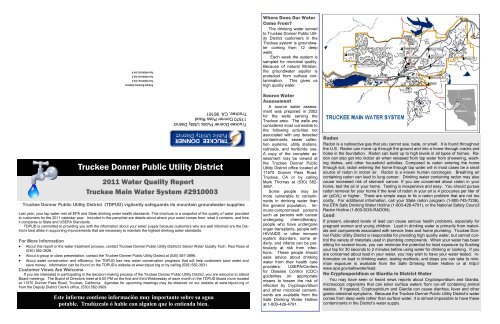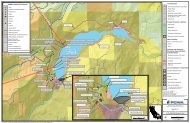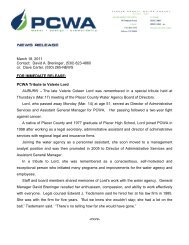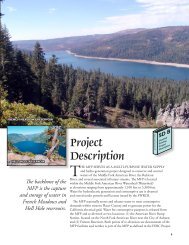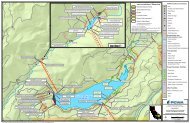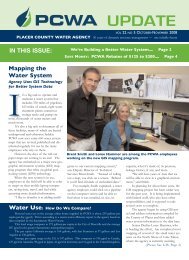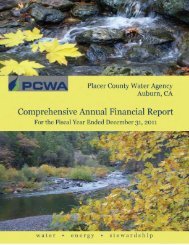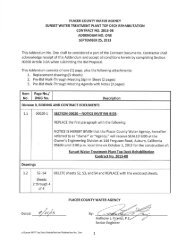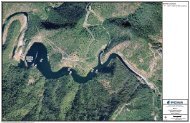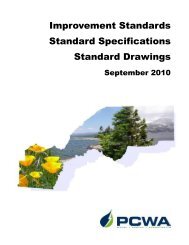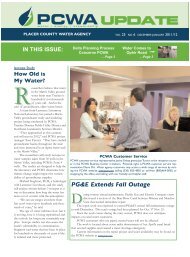Martis Valley Groundwater Management Plan - Placer County Water ...
Martis Valley Groundwater Management Plan - Placer County Water ...
Martis Valley Groundwater Management Plan - Placer County Water ...
Create successful ePaper yourself
Turn your PDF publications into a flip-book with our unique Google optimized e-Paper software.
Primary Business Address<br />
Your Address Line 2<br />
Your Address Line 3<br />
Your Address Line 4<br />
Truckee Donner Public Utility District<br />
2011 <strong>Water</strong> Quality Report<br />
Truckee Main <strong>Water</strong> System #2910003<br />
Truckee Donner Public Utility District (TDPUD) vigilantly safeguards its mountain groundwater supplies<br />
Last year, your tap water met all EPA and State drinking water health standards. This brochure is a snapshot of the quality of water provided<br />
to customers for the 2011 calendar year. Included in this pamphlet are details about where your water comes from, what it contains, and how<br />
it compares to State and USEPA Standards.<br />
TDPUD is committed to providing you with the information about your water supply because customers who are well informed are the District’s<br />
best allies in supporting improvements that are necessary to maintain the highest drinking water standards.<br />
For More Information<br />
About this report or the water treatment process, contact Truckee Donner Public Utility District’s Senior <strong>Water</strong> Quality Tech, Paul Rose at<br />
(530) 582-3926.<br />
About a group or class presentation, contact the Truckee Donner Public Utility District at (530) 587-3896.<br />
About water conservation and efficiency, the TDPUD has new water conservation programs that will help customers save water and<br />
save money. Information can be found on the TDPUD’s website at www.tdpud.org or by calling (530) 582-3931.<br />
Customer Views Are Welcome<br />
If you are interested in participating in the decision-making process of the Truckee Donner Public Utility District, you are welcome to attend<br />
Board meetings. The Board of Directors meet at 6:00 PM on the first and third Wednesday of each month in the TDPUD Board room located<br />
at 11570 Donner Pass Road, Truckee, California. Agendas for upcoming meetings may be obtained on our website at www.tdpud.org or<br />
from the Deputy District Clerk’s office, (530) 582-3909.<br />
Este informe contiene información muy importante sobre su agua<br />
potable. Tradúzcalo ó hable con alguien que lo entienda bien.<br />
Truckee Donner Public Utility District<br />
11570 Donner Pass Road<br />
Truckee, CA 96161<br />
Where Does Our <strong>Water</strong><br />
Come From?<br />
The drinking water served<br />
to Truckee Donner Public Utility<br />
District customers in the<br />
Truckee system is groundwater<br />
coming from 12 deep<br />
wells.<br />
Each week the system is<br />
sampled for microbial quality.<br />
Because of natural filtration,<br />
the groundwater aquifer is<br />
protected from surface contamination.<br />
This gives us<br />
high quality water.<br />
Source <strong>Water</strong><br />
Assessment<br />
A source water assessment<br />
was prepared in 2002<br />
for the wells serving the<br />
Truckee area. The wells are<br />
considered most vulnerable to<br />
the following activities not<br />
associated with any detected<br />
contaminants: sewer collection<br />
systems, utility stations,<br />
railroads, and herbicide use.<br />
A copy of the complete assessment<br />
may be viewed at<br />
the Truckee Donner Public<br />
Utility District office located at<br />
11570 Donner Pass Road,<br />
Truckee, CA or by calling<br />
Mark Thomas at (530) 582-<br />
3957.<br />
Some people may be<br />
more vulnerable to contaminants<br />
in drinking water than<br />
the general population. Immuno-compromised<br />
persons<br />
such as persons with cancer<br />
undergoing chemotherapy,<br />
people who have undergone<br />
organ transplants, people with<br />
HIV/AIDS or other immune<br />
system disorders, some elderly,<br />
and infants can be particularly<br />
at risk from infections.<br />
These people should<br />
seek advice about drinking<br />
water from their health care<br />
providers. USEPA/Centers<br />
for Disease Control (CDC)<br />
guidelines on appropriate<br />
means to lessen the risk of<br />
infection by Cryptosporidium<br />
and other microbial contaminants<br />
are available from the<br />
Safe Drinking <strong>Water</strong> Hotline<br />
at 1-800-426-4791.<br />
Radon<br />
Radon is a radioactive gas that you cannot see, taste, or smell. It is found throughout<br />
the U.S. Radon can move up through the ground and into a home through cracks and<br />
holes in the foundation. Radon can build up to high levels in all types of homes. Radon<br />
can also get into indoor air when released from tap water from showering, washing<br />
dishes, and other household activities. Compared to radon entering the home<br />
through soil, radon entering the home through tap water will in most cases be a small<br />
source of radon in indoor air. Radon is a known human carcinogen. Breathing air<br />
containing radon can lead to lung cancer. Drinking water containing radon may also<br />
cause increased risk of stomach cancer. If you are concerned about radon in your<br />
home, test the air in your home. Testing is inexpensive and easy. You should pursue<br />
radon removal for your home if the level of radon in your air is 4 picocuries per liter of<br />
air (pCi/L) or higher. There are simple ways to fix a radon problem that are not too<br />
costly. For additional information, call your State radon program (1-800-745-7236),<br />
the EPA Safe Drinking <strong>Water</strong> Hotline (1-800-426-4791), or the National Safety Council<br />
Radon Hotline (1-800-SOS-RADON).<br />
Lead<br />
If present, elevated levels of lead can cause serious health problems, especially for<br />
pregnant women and young children. Lead in drinking water is primarily from materials<br />
and components associated with service lines and home plumbing. Truckee Donner<br />
Public Utility District is responsible for providing high quality water, but cannot control<br />
the variety of materials used in plumbing components. When your water has been<br />
sitting for several hours, you can minimize the potential for lead exposure by flushing<br />
your tap for 30 seconds to 2 minutes before using water for drinking or cooking. If you<br />
are concerned about lead in your water, you may wish to have your water tested. Information<br />
on lead in drinking water, testing methods, and steps you can take to minimize<br />
exposure is available from the Safe Drinking <strong>Water</strong> Hotline or at http://<br />
www.epa.gov/safewater/lead.<br />
No Cryptosporidium or Giardia in District <strong>Water</strong><br />
You may have seen or heard news reports about Cryptosporidium and Giardia,<br />
microscopic organisms that can enter surface waters from run-off containing animal<br />
wastes. If ingested, Cryptospridium and Giardia can cause diarrhea, fever and other<br />
gastro-intestinal symptoms. Because the Truckee Donner Public Utility District’s water<br />
comes from deep wells rather than surface water, it is almost impossible to have these<br />
contaminants in the District’s water supply.


